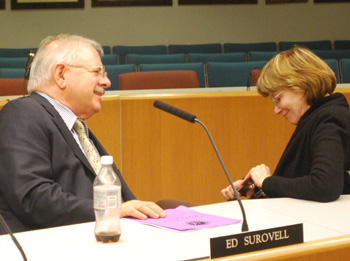Ann Arbor Library Board Briefed on Tax Issue
Ann Arbor District Library board meeting (Sept. 19, 2011): Much of Monday’s 20-minute public meeting was spent discussing the possible repeal of the state’s personal property tax – a move that would take an estimated $637,000 out of the library’s roughly $12 million annual budget.
Josie Parker briefed the board during her director’s report, saying she wanted trustees to be aware of the issue and of its potential impact on the library’s finances. Legislation has been introduced, but it’s not yet clear whether lawmakers will decided to eliminate the tax completely or simply reduce it. Also unclear is what – if any – options would be available to taxing authorities to replace that lost revenue. Parker noted that when Pfizer closed its Ann Arbor operation several years ago, the library also took a hit. Pfizer had been the city’s largest taxpayer.
Parker’s report also included news about a lawsuit brought by Herrick District Library against the Library of Michigan. The state library has decided not to appeal an August court of appeals decision, which ruled in favor of Herrick’s position. Herrick had challenged new rules that would have changed how public libraries qualify for state aid. The changes were seen as a threat to local control, by taking away certain decision-making authority from local libraries. AADL was the only individual library in the state to file an amicus curiae brief in support of Herrick.
There was no board discussion about a potential response to the Ann Arbor Downtown Development Authority’s excess tax capture decision. At issue is the interpretation of a city ordinance about tax increment finance (TIF) capture in the DDA’s downtown district. In July, the DDA board passed a resolution stating its opinion that the city’s ordinance does not require the DDA to return any money to taxing authorities in its TIF district – despite the fact that the DDA had already returned excess TIF revenue earlier this year.
The AADL is a taxing authority in the DDA’s TIF district and has been consulting with its legal counsel over the implications of that decision, as well as a possible response. Queried by The Chronicle after Monday’s meeting, Parker said the AADL has made no decision yet on the issue. [For background and analysis of the excess tax capture, see Chronicle columns: “Taxing Math Needs Another Look” and “TIF Capture is a Varsity Sport.”] [Full Story]




